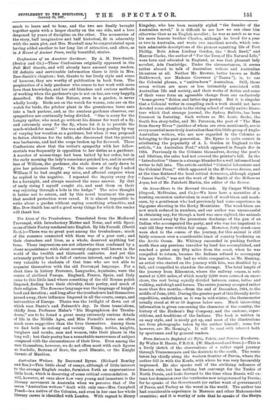Australian Writers. By Desmond Byrne. (Richard Bentley and Son.)—This little
sheaf of essays, although of little interest to the average English reader, furnishes forth an unpretentious little book, which is deserving of some critical commendation. It will, however, at once show liciw very young and immature is the literary movement in Australia when we perceive that of the seven "Australian writers" dealt with only one—Mrs. Campbell Praed--is a native of the Colonies, and even in her case her whole literary Meer iS identified with London. With regard to Henry
Kingsley, who has been recently styled "the founder of the Australian novel," it is difficult to see how we can class him otherwise than as an English novelist ; he was as much so as was his more famous brother Charles, although he lived for a year or two in Australia, and wrote two excellent novels, which con- tain admirable descriptions of the pioneer squatting life of Port Phillip. Both Adam Lindsay Gordon, the "Bush Bard," and Marcus Clarke, the author of "For the Term of His Natural Life," were born and educated in England, as was that pleasant lady novelist, Ada Cambridge. Under the circumstances, it seems rather absurd to talk of Australian writers and Australian literature at all. Neither Mr. Browne, better known as Rolfe Boldrewood, nor Madame Couvreur (" Teems."), is, to use the Colonial phrase, a " native-born " Australian. Still, these seven writers are more or less intimately associated with Australian life and society, and their works of fiction and some of their verse form an agreeable change from our exclusively " home-grown " fiction and latter-day poetry. But it is singular that a Colonial writer in compiling such a work should not have devoted some attention to the rising school of really native litera- ture which that strange journal, the Sydney Bulletin, has been foremost in fostering. Such writers as Mr. Louis Becke, the South Sea story-teller, and Mr. Paterson, the poet of "The Man from Snowy River" (neither of whom are even mentioned), are in every essential more truly Australian than this little group of Anglo- Australian writers, who are now regarded in the Colonies as belonging to the past generation. Mr. Byrne is quite correct in attributing the popularity of A. L. Gordon in England to the article, "An Australian Poet," which appeared-in Temple Bar in 1884. Previously in the Colonies themselves, during the poet's sad lifetime, the sales had not covered the printer's bill. In the " Introduction " there is a strange blunder for a well informed local writer to fall into. The article entitled "Colonial Literature and the Colonial Press," which appeared in the Melbourne Review, and at the time fluttered the local critical dovecotes, although signed "James Smith," was not the work of Mr. Smith of the Melbourne Argus, but of Mr. Patchett Martin, the editor of the Review.


















































 Previous page
Previous page